Large numbers of Palestinians and Ukrainians were killed in missile strikes days apart, writes Jonathan Cook. The differing coverage of these comparable events is the clue to the media’s true function.
The New York Times building, 2012. (Ermell, CC BY-SA 4.0, Wikimedia Commons)
By Jonathan Cook
Jonathan-Cook.net
 When all we have to rely on in understanding our relationship to the news media is the media’s self-proclaimed assessment of its own role, maybe it is no surprise that most of us assume the West’s “free press” is a force for good: the bedrock of democracy, the touchstone of a superior western civilisation.
When all we have to rely on in understanding our relationship to the news media is the media’s self-proclaimed assessment of its own role, maybe it is no surprise that most of us assume the West’s “free press” is a force for good: the bedrock of democracy, the touchstone of a superior western civilisation.
The more idealistic among us think of the news media as something akin to a public service. The more cynical of us think of it as a competitive marketplace in information and commentary, one in which ugly agendas are often in evidence but truth ultimately prevails.
Both views are fanciful. The reality is far, far darker – and I speak as someone who worked for many years in The Guardian and Observer newsrooms, widely seen as the West’s most progressive newspapers.
As readers, we don’t, as we imagine, “consume” news. Rather, the news consumes us. Or put another way, the media uses the news to groom us, its audience. Properly understood, the relationship is one of abuser and abused.
Sounds like a paranoid conspiracy theory?
In fact, just such an argument was set out many years ago — in more academic fashion — in Noam Chomsky and Ed Herman’s book Manufacturing Consent.
If you have never heard of the book, there may be a reason. The media don’t want you reading it.
When I worked at The Guardian, there was no figure more reviled in the newsroom by senior editors than Noam Chomsky. As young journalists, we were warned off reading him. How might we react were we to start thinking more deeply about the role of the media, or begin testing the limits of what we were allowed to report and say?
Chomsky and Herman’s Propaganda Model explains in detail how Western publics are “brainwashed under freedom” by a media driven by hidden corporate and state interests. Those interests can be concealed only because the media decides what counts as news and frames how we understand events.
Its chief tools are misdirection and omission — and, in extremis, outright deception.
Tribal Camps

Election Day: The Newseum’s Campaign 2016 exhibit in Washington, D.C. (Lorie Shaull, Flickr, CC BY 2.0)
The Propaganda Model acknowledges that competition is permitted in the news media. But only of a narrow, superficial kind, meant to divide us more usefully into tribal, ideological camps – defined as the left and the right.
Those camps are there to keep us imagining that we enjoy a plurality of ideas, that we are in charge of our response to events, that we elect governments — just as we enjoy a choice between watching the BBC and Fox News.
But our herding into oppositional camps isn’t really about choice. The camps are there to keep us divided, so we can be more easily manipulated and ruled. They are there to obscure from us the deeper reality that the state-corporate media is the public relations arm of an establishment that needs us weak.
To survive, the Western power establishment has to engineer two related kinds of popular endorsement.
First, we must consent to the idea that the West has an inalienable right to control the Earth’s resources, even at the cost of committing terrible crimes both against the rest of humanity, such as the current genocide in Gaza, and against other species, as we wreck the natural world in our pursuit of impossible, endless economic growth on a finite planet.
And second, we must consent to the idea that the richest and most powerful elites in the West have an inalienable right to cream off most of the profits from this industrialised rape of our only home.
The media rarely identifies this wasteful, greed system, so normalised has it become. But when given a name, it is called capitalism. It emerges from the shadows only when the media need to confront and ridicule a bogeyman caricature of its main ideological rival, socialism.
Immersed in Propaganda
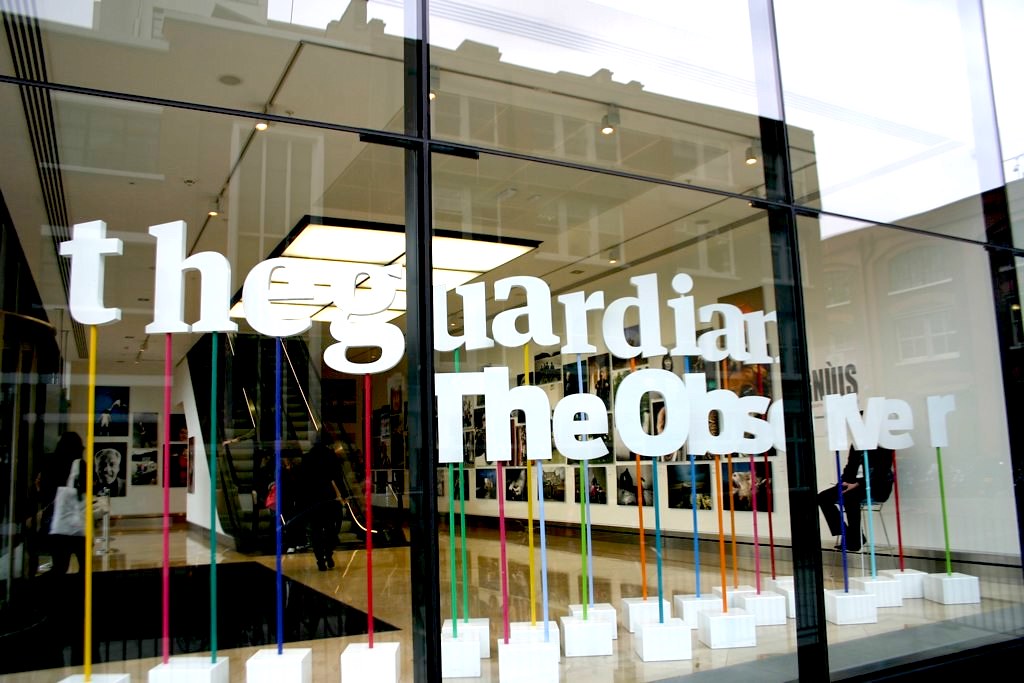
Guardian’s office in London, 2010. (Michael Brunton-Spall, Flickr, CC BY 2.0)
The news media have been fantastically successful at making a system of suicidal resource extraction designed to enrich a tiny number of billionaires seem entirely normal to their audiences.
Which is why those same billionaires are as keen to own the news media as they are to own politicians. In fact, gain ownership of the media, and you own the political class too. It is the ultimate two-for-one offer.
No politician can afford to take on key state-corporate interests, or the media that veils those interests — as Jeremy Corbyn soon found out in the U.K. a few years back.
I have spent the past 15 years or more trying to highlight to readers the true nature of our relationship to the media — the groomer and groomed — using the media’s coverage of major news events as a practical peg on which to hang my analysis.
Talking about the abusive relationship purely in the abstract is likely to persuade few, given how deeply we are immersed in propaganda.
Understanding how the media carries out its day-to-day switch and baits, its omissions, deceptions and misdirections, is the key to beginning the process of freeing our minds.
If you look to the state-corporate media for guidance, you are already in its clutches. You are already a victim — a victim of your own suffocating ignorance, of your own self-sabotage, of your own death wish.
I have expended many hundreds of thousands of words on this topic, as have others such as Media Lens. You can read a few recent examples from me here, here and here. Or you can watch this talk I gave on how I freed myself professionally from the clutches of the corporate media and gained my freedom as an independent journalist:
Different Narratives
But rarely do we have examples of propaganda so flagrant from our “free press” that it is hard for readers not to notice them. The state-corporate media just made my job a little easier.
Earlier this month, it reported on two closely comparable events that it framed in entirely different ways. Ways that all too clearly serve state-corporate interests.
The first such event was an Israeli air strike on July 6 on a school in Gaza, where Palestinian civilians, including children, had been sheltering from months of a rampaging Israeli military that has slaughtered many tens of thousands of Palestinians and destroyed most of the enclave’s homes and infrastructure.
The massive scale of death and destruction in Gaza has forced the World Court to put Israel on trial for genocide — not that you would know that from the media coverage. The genocide case against Israel has been largely disappeared down the memory hole.
The second event, on July 8, was a Russian air strike on a hospital in Kyiv. It was part of a wave of attacks on Ukrainian targets that day that killed 36 Ukrainians.
Let us note that on a typical day in Gaza, at least 150 Palestinians are killed by Israel. That has been happening day-after-day for nine months. And the death toll is almost certainly a massive under-estimate. In decimated Gaza, unlike Ukraine, officials long ago lost the ability to count their dead.
Let us note too that, despite huge numbers of Palestinian women and children being killed each day by Israeli missiles, the news media largely stopped covering the carnage in Gaza months ago. The BBC’s main evening news barely reports it.
The fact alone that the killing of 36 Ukrainian civilians attracted so much attention and concern from the Western media, in a war that’s more than two years old, when there is a far larger daily death toll of Palestinian civilians in Gaza, which our governments have been directly aiding, and the slaughter is of more recent origin, is telling in and of itself.
So how did our most trusted and progressive media outlets report these comparable events, in Gaza and Ukraine?
The headlines tell much of the story.
In an all-too-familiar pattern, the BBC shouted from the rooftops: “At least 20 dead after ‘massive’ Russian missile attack on Ukraine cities”. It named Russia as responsible for killing Ukrainians, and did so even when there was still some debate about whether Russian missiles or Ukrainian air-defence missiles had caused the destruction.

Meanwhile, the BBC carefully avoided identifying Israel as the party that killed those in Gaza sheltering from its bombs, even though Israel long ago stopped pretending that feeble Palestinian rockets could cause damage on such a scale. The headline read: “Air strike on Gaza school kills at least 15 people.”
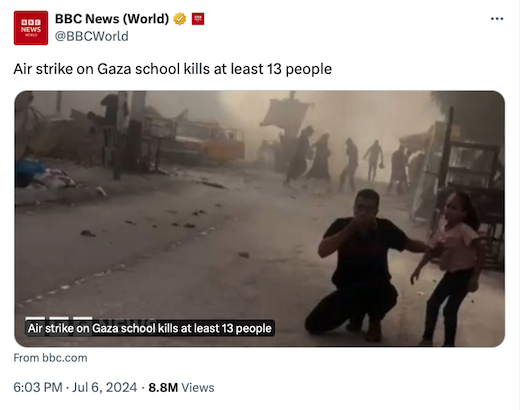
The Guardian’s headlines were even more revealing.
The paper did, at least, identify Israel as responsible for the killing: “Israeli strike on Gaza school kills 16, say Palestinian officials.”
However, the dry, matter-of-fact language about those Palestinian deaths, the suggestion that the deaths were only a claim, and the attribution of that claim to “Palestinian officials” (with the now widely accepted implication that those officials can’t be trusted) was intended to steer the emotional response of readers. They would be left cold and indifferent.
The framing was clear: this was just another, routine day in Gaza. No need to be overly invested in Palestinian suffering.

Contrast that with the entirely different tone The Guardian struck in its headlines on the cover story (below) of the attack on Ukraine: “‘No words for this’: horror over Russian bombing of Kyiv children’s hospital.”
The subhead reads: “Witnesses express shock and revulsion after deadly missile strike on Ukraine’s largest paediatric clinic.” [Human Rights Watch said only child died and 10 were injured compared to the much larger casualties in the Gaza attack.]
The emphasis is on “horror”, “shock”, “revulsion”. “No words”, we are told, can convey the savagery of this atrocity. The headline’s emphasis is on the targeting of “children” with a “deadly missile”.
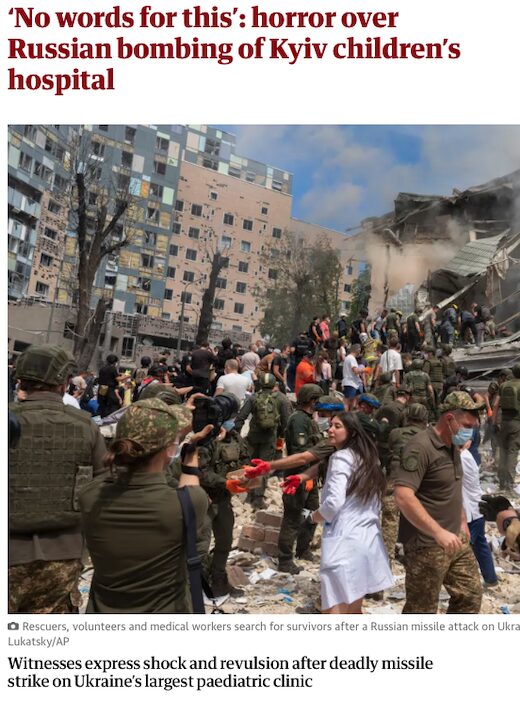
All of which, of course, could be equally said about the horror of Israel’s targeting of Palestinian children day-in, day-out. But, of course, isn’t.
Swaying Readers
If this isn’t convincing enough, take another example of The Guardian’s treatment (below) of comparable events in Gaza and Ukraine.
Here is how the paper reported Israel destroying Gaza’s largest hospital back in November, when such actions had not yet become routine, as they are now, and when it had killed far larger numbers of civilians at the hospital in Gaza than Russia did in Ukraine.
The headline reads clinically: “IDF says it has entered Gaza’s al-Shifa hospital in ‘targeted’ operation against Hamas.”
The Guardian readily repeats the Israeli military’s terminology, conferring legitimacy on the carnage at al-Shifa hospital as a “targeted operation.”
The fact that patients and medical personnel were the main victims is obscured by The Guardian’s repeating of Israel’s claim that it was simply “targeting Hamas” – just as Israel’s wanton destruction of Gaza has supposedly been about “eliminating Hamas”, even as Hamas grows stronger.
Apparently there is no “horror, “shock” or “revulsion” at The Guardian over the destruction and killing spree at Gaza’s largest hospital. Such sentiments are reserved for Ukraine.
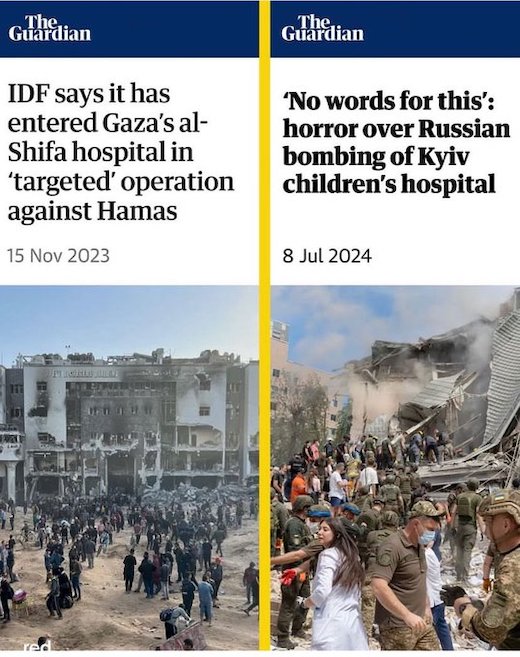
The same differences are illustrated in the U.S. “liberal” media, as Alan MacLeod noted on X.
A day after Russia’s strike on Ukraine, Israel was attacking another school shelter in Gaza. The New York Times made it clear how differently readers were supposed to feel about these similar events.
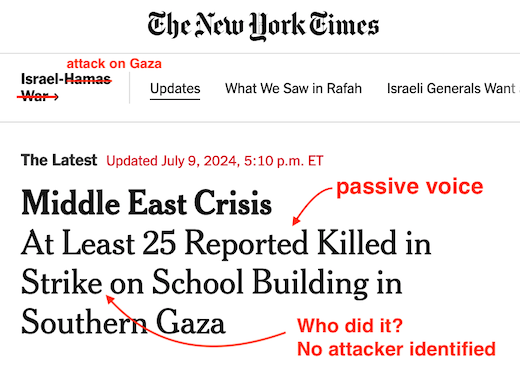
Headline: “At Least 25 Reported Killed in Strike on School Building in Southern Gaza.”
Note the passive, uncertain treatment – this was, after all, only a report. Note too that the perpetrator, Israel, remains unidentified.
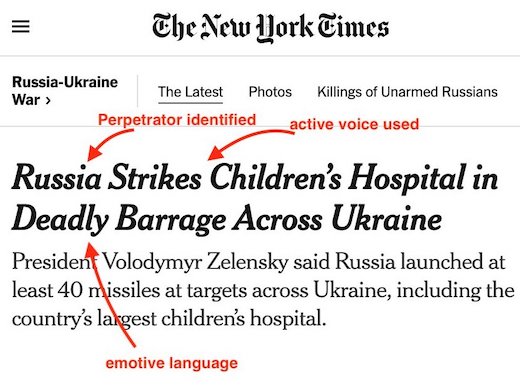
Headline: “Russia Strikes Children’s Hospital in Deadly Barrage Across Ukraine.”
In stark contrast, Russia is clearly identified as the perpetrator, the active voice is used to describe its crime, and once again emotional descriptors — “deadly” — can be readily deployed to sway readers into an emotional response.
Headlines and photos are the part of a story that almost every reader sees. Which is why their role in framing our understanding of events is so important. They are the print media’s main means of propagandising us.
Skewed Priorities
Broadcast media like the BBC work slightly differently in manipulating our responses.
Running orders — the channel’s way to signal its news priorities — are important, as are the emotional reactions of anchors and reporters. Just think of the way Steve Rosenberg, the BBC’s Moscow correspondent, half-stifles a sneer every time he mentions Vladimir Putin by name, or how he struggles to suppress a scoff at any of the Russian president’s statements.
Then try to imagine any BBC reporter being allowed to do the same with Israeli Prime Minister Benjamin Netanyahu, let alone British leader Sir Keir Starmer.
Another way to make us invested in some events but not others is by concentrating on what are called “human-interest” stories, taking ordinary individuals and making their troubles and suffering the focus of a piece rather than the usual talking heads.
The BBC evening news, for example, has largely stopped reporting on Gaza’s suffering. When it does, reports occur briefly and late in the running order and they usually cover little more than the dry facts. Human-interest stories have been rare.
The BBC broke with that trend twice on Tuesday’s News at Ten – in the midst of Israel twice targeting schools that were supposed to be offering shelter to Palestinians driven from their homes by Israeli bombs.
Did the BBC tell the stories of the victims of those air strikes? No, those attacks received the most minimal coverage.
The first human-interest story concerned a Ukrainian mother, shown desperately searching for her child in the aftermath of the attack on the Kyiv hospital the previous day, as well as their later reunion.
The second human-interest story, this one from Gaza, didn’t concern any of the many victims of the Israeli attacks on school-shelters. It focused instead — and at great length — on a Palestinian man beaten in Gaza for opposing Hamas rule.
In other words, not only did the BBC consider the day-old deaths of Ukrainians far more important news than Israel’s killing that day of 29 Palestinian civilians, but it also considered the beating of a man by Hamas as a bigger news priority too.
When we are encouraged to care about Palestinians, it is only when the odd one is being brutalised by other Palestinians, not when millions of them are being brutalised by their occupier, Israel, in their ghetto-prisons.
The pattern to this skewing of news priorities, the constant distorted framing of events is the clue to how we should decipher what the media is trying to achieve, what it is there to do.
BBC news coverage all too often looks like it is exploiting any opportunity to highlight violence by Russia, in strict accordance with British foreign policy objectives. Equally, it all too often looks like the BBC is engineering pretexts to ignore or downplay violence by Israel, again in strict accordance with British foreign policy objectives.
Ukraine is a key battleground for the West in its battle for global “full-spectrum dominance”, Washington’s central foreign policy strategy in which it positions itself so that no other great power, such as Russia and China, can challenge its control over the planet’s resources. The U.S. and its Western allies are ready to risk an entirely unnecessary nuclear war, it seems, to win that battle.
Israel, meanwhile, a colonial fortress-state implanted by the West into the oil-rich Middle East, is a critically important ally in realising Washington’s dominance in its region. The Palestinians are the fly in the ointment — and like a fly, they can be swatted away with utter indifference and impunity.
With this as our framework, we can understand why the BBC and other media fail so systematically to fulfill their self-professed remits to reporting objectively and disinterestedly, and fail to scrutinise and hold power to account — unless it is the power of an Official Enemy.
The truth is the BBC, The Guardian and the rest are nothing more than conduits of state-corporate propaganda, masquerading as news outlets.
Until we grasp that, they will continue grooming us.
Jonathan Cook is an award-winning British journalist. He was based in Nazareth, Israel, for 20 years. He returned to the U.K. in 2021. He is the author of three books on the Israel-Palestine conflict: Blood and Religion: The Unmasking of the Jewish State (2006), Israel and the Clash of Civilisations: Iraq, Iran and the Plan to Remake the Middle East (2008) and Disappearing Palestine: Israel’s Experiments in Human Despair (2008). If you appreciate his articles, please consider offering your financial support.
This article is from the author’s blog, Jonathan Cook.net.
Post Disclaimer
Disclaimer: The Corporate News Media at Work - Views expressed by writers in this section are their own and do not necessarily reflect www.globalmuslimscenario.com/ point-of-view
Post Disclaimer |
IMPORTANT : All content hosted on globalmuslimscenario.com is solely for non-commercial purposes and with the permission of original copyright holders. Any other use of the hosted content, such as for financial gain, requires express approval from the copyright owners.